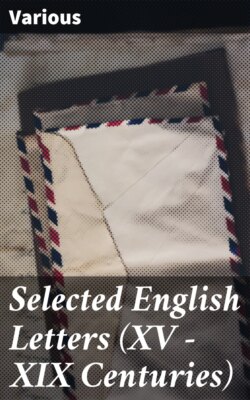Читать книгу Selected English Letters (XV - XIX Centuries) - Various - Страница 73
На сайте Литреса книга снята с продажи.
TO JONATHAN SWIFT
ОглавлениеTable of Contents
Friends to posterity
23 March, 1727–8.
I send you a very odd thing, a paper printed in Boston, in New England, wherein you will find a real person, a member of their parliament, of the name of Jonathan Gulliver. If the fame of that traveller has travelled thither, it has travelled very quick, to have folks christened already by the name of the supposed author. But if you object that no child so lately christened could be arrived at years of maturity to be elected into parliament, I reply (to solve the riddle) that the person is an Anabaptist, and not christened till full age, which sets all right. However it be, the accident is very singular that these two names should be united.
Mr. Gay's opera has been acted near forty days running, and will certainly continue the whole season. So he has more than a fence about his thousand pounds; he will soon be thinking of a fence about his two thousand. Shall no one of us live as we would wish each other to live? Shall he have no annuity, you no settlement on this side, and I no prospect of getting to you on the other? This world is made for Caesar—as Cato said, for ambitious, false, or flattering people to domineer in; nay, they would not, by their good will, leave us our very books, thoughts, or words in quiet. I despise the world yet, I assure you, more than either Gay or you, and the court more than all the rest of the world. As for those scribblers for whom you apprehend I would suppress my Dulness (which, by the way, for the future you are to call by a more pompous name, the Dunciad), how much that nest of hornets are my regard will easily appear to you when you read the Treatise of the Bathos.
At all adventures, yours and mine shall stand linked as friends to posterity, both in verse and prose, and (as Tully calls it) in consuetudine studiorum. Would to God our persons could but as well and as surely be inseparable! I find my other ties dropping from me; some worn off, some torn off, some relaxing daily: my greatest, both by duty, gratitude, and humanity, time is shaking every moment, and it now hangs but by a thread! I am many years the older for living so much with one so old; much the more helpless for having been so long helped and tendered by her; much the more considerate and tender, for a daily commerce with one who required me justly to be both to her; and consequently the more melancholy and thoughtful; and the less fit for others, who want only in a companion or a friend to be amused or entertained. My constitution too has had its share of decay as well as my spirits, and I am as much in the decline at forty as you at sixty. I believe we should be fit to live together could I get a little more health, which might make me not quite insupportable. Your deafness would agree with my dulness; you would not want me to speak when you could not hear. But God forbid you should be as destitute of the social comforts of life as I must when I lose my mother; or that ever you should lose your more useful acquaintance so utterly, as to turn your thoughts to such a broken reed as I am, who could so ill supply your wants. I am extremely troubled at the return of your deafness; you cannot be too particular in the accounts of your health to me; everything you do or say in this kind obliges me, nay, delights me, to see the justice you do me in thinking me concerned in all your concerns; so that though the pleasantest thing you can tell me be that you are better or easier; next to that it pleases me that you make me the person you would complain to.
As the obtaining the love of valuable men is the happiest end I know of this life, so the next felicity is to get rid of fools and scoundrels; which I cannot but own to you was one part of my design in falling upon these authors, whose incapacity is not greater than their insincerity, and of whom I have always found (if I may quote myself),
That each bad author is as bad a friend.
This poem will rid me of these insects.
Cedite, Romani scriptores, cedite, Graii; Nescio quid maius nascitur Iliade.
I mean than my Iliad; and I call it Nescio quid, which is a degree of modesty; but however, if it silence these fellows, it must be something greater than any Iliad in Christendom. Adieu.
